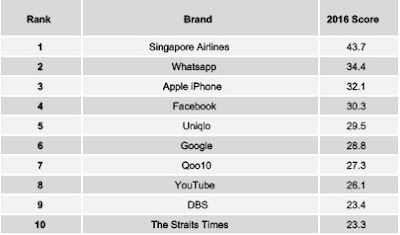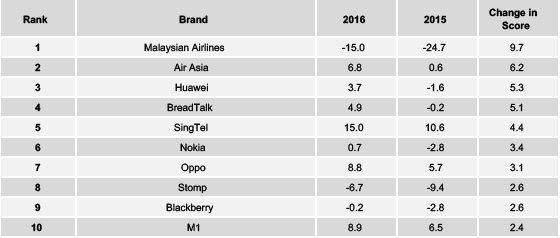Source: Yougov Brandindex. Brand rankings for 2016.
The 2016 YouGov Brandindex rankings show that Singaporeans have a strong preference for both local and digital brands. Singapore Airlines, DBS bank, The Straits Times newspaper, WhatsApp, and the Apple iPhone (in the top three) all made the list. Other popular tech brands included Facebook, Google, e-commerce platform Qoo10, and YouTube.
Brands were evaluated based on their BrandIndex Buzz score, which asks respondents whether their exposure to the brand in the previous two weeks, through advertising, news, or word of mouth, was positive or negative.
This Buzz Rankings chart displays the brands with the highest average Buzz scores from January to December 2016.
Source: Yougov Brandindex. Buzz brand ranking improvements from 2015 to 2016.
The Buzz Improvers chart compares and ranks brands based on how much their Buzz scores improved between 2015 and 2016. The scores represent the general population’s perceptions.
Malaysia Airlines (formerly Malaysian Airlines), AirAsia, and Huawei were the most improved brands in terms of Buzz. Huawei, in particular, went from negative territory in 2015 to positive digits in 2016, while Malaysia Airlines improved but remained in negative territory. The loss of planes in 2014 likely impacted public perception of both Malaysia Airlines and AirAsia, demonstrating the long-term consequences of such events on brand reputation. Although Malaysia Airlines flight MH370 had yet to be recovered at the time of writing, AirAsia’s Buzz score rose from low positive in 2015 to much higher in 2016, demonstrating that brands can recover.
Other noteworthy findings included:
+All of the quick service (QSR) and casual dining brands were American: McDonald’s, Starbucks, and Subway. McDonald’s, the local eatery EAT, and the bakery BreadTalk all saw significant increases in Buzz. BreadTalk was found repackaging another brand’s pre-packaged soy milk as its own homemade product in 2015, enraging customers. Following that, the bakery released a new “commemorative bun” as the country mourned the death of Singapore’s founding father, Lee Kuan Yew, in March 2015. The product’s name was a play on the Lee family name, and a portion of the proceeds were donated to charity.
+DBS, its subsidiary POSB Bank, and OCBC were the winners in finance. Paypal, UBS, and IG Markets saw the largest increases in Buzz, with UBS and IG Markets moving from low to positive scores. NTUC Income, Prudential, and Great Eastern are the leaders in insurance. Etiqa, Tenet Sompo (whose parent company is based in Japan), and Zurich Life all increased their scores significantly, all from low positive starting points.
+In Singapore, social media users prefer WhatsApp, Facebook, and YouTube. Google, LinkedIn, MSN, and KakaoTalk were among the ‘Other’ Internet brands that saw significant increases in Buzz this year. LinkedIn is ranked fifth among the top five social media brands, while MSN and KakaoTalk made modest gains from a smaller Buzz score starting point. Yahoo and Jobstreet were in the top three. The top Buzz improvers this year were Fastjobs, Baidu, and Craigslist. However, Baidu and Craigslist remain in the red.
+Apple swept the mobile space, with the iPhone, Apple, and the iPad taking the top three spots. Huawei, Nokia, and OPPO all saw significant increases in Buzz, while Blackberry and Motorola moved from more negative to nearly positive scores, finishing fourth and fifth on the improvement list.
+In Singapore, news was given its own Brandindex category. The daily The Straits Times, Mediacorp’s regional broadcaster Channel NewsAsia, and Mediacorp’s Today newspaper were in the top three, while online community Stomp, business publication The Edge, and free Tamil language daily Tabla! all saw significant increases in Buzz. Stomp and Tabla! are owned by the same parent company as The Straits Times, Singapore Press Holdings.
+H&M, Uniqlo, and G2000, all single-brand fashion retailers, were the most well-known on the fashion retailers list. Bershka’s Buzz scores skyrocketed.
+Singapore Airlines, Emirates, and Cathay Pacific were among the most well-known airlines for travel. Malaysia Airlines, Air Asia, and Air China all improved their Buzz scores. Although Malaysia Airlines performed the best, it is still in negative territory, whereas Air Asia went from negative to significantly more positive. Though Air China and China Eastern Airlines made progress, their Buzz scores remained negative.
+Ironically, Airbnb, an e-marketplace for private property, was the top brand among Singapore hotels. Shangri-La and Fullerton were in the top three. In 2016, Hilton saw the greatest increase in Buzz. The false ceiling above the hotel’s driveway collapsed in December 2015, damaging cars and injuring people; the negative connotations persisted into 2016.
+In the e-commerce/m-commerce category, e-marketplaces Qoo10 and Carousell were followed by global e-marketplace Amazon. Despite announcing plans to enter the market in Q117, Amazon does not yet have a presence in Singapore. The launch was later postponed. Over the last year, Lazada, the e-supermarket Redmart, and Hipvan have all grown in popularity. Lazada’s 2016 score is lower than that of fashion e-tailer Zalora and Groupon (acquired by Fave in March 2017), which came in fourth and fifth place, respectively.
*All Buzz scores listed have been rounded to one decimal place; greater precision was used internally to determine rankings.

